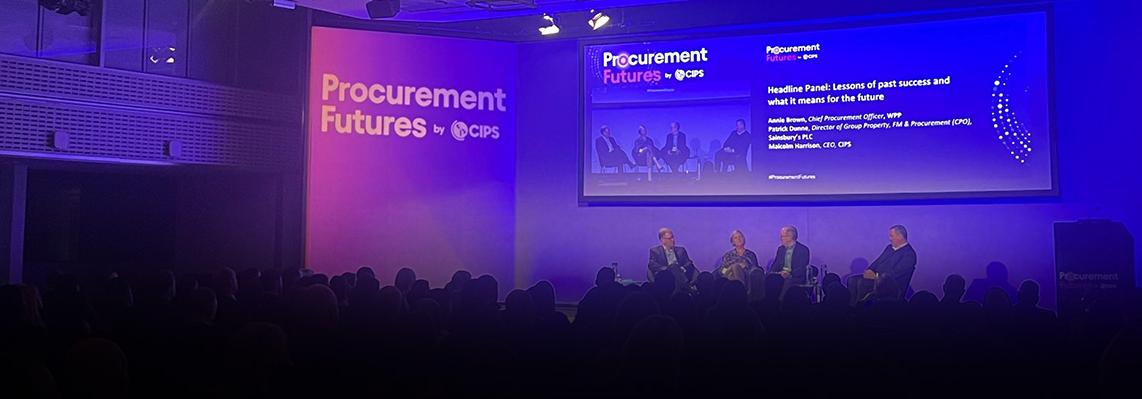Here we share the key themes from the 2023 Procurement Futures conference exploring the opportunities and challenges facing procurement today
Malcolm Harrison is CEO of the Chartered Institute for Procurement and Supply (CIPS) and has worked in the industry for more than four decades. In all that time, he has never seen anything like the last few years. “Everything’s changed,” he told those gathered online and in person at the Queen Elizabeth II Centre, London, at the opening of Procurement Futures, the annual CIPS conference.
Harrison described a paradigm shift within procurement driven by global events such as the coronavirus pandemic. The resulting disruption placed a spotlight on supply chains and created an environment in which resilience, agility and efficiency have become more effective (and therefore more important) than low cost and just-in-time.
How do we adapt to this, asked Harrison. How is the world we work in changing and how is the profession changing? These questions underpinned the discussions that followed over the course of the two-day event.
Procurement is a business function
Some of the topics covered during the conference were long-standing issues familiar to any procurement professional. During the first session, for instance, panellists were asked for their advice about a perennial challenge: how to manage stakeholders. The response? “Understand where they’re coming from and what the issue is,” replied one industry veteran. “Understand the different stakeholder groups, what they want and are trying to achieve. What’s driving them might not be what you think it is.”
“You have to be good at storytelling and connect this to business objectives”Bernhard Raschke, Chief Transformation Officer, RS Group
One of the most prominent themes at the event, however, has emerged out of the tumult of recent years. Across panels and speeches covering various subjects, participants argued that procurement is a critical business function and to be successful, those responsible for procurement need to align with broader corporate goals. Make a strong business case, said Bernhard Raschke, Chief Transformation Officer at RS Group. “You have to be good at storytelling and connect this to business objectives – not just profit but innovation and value.”
Others made similar statements, “Don’t be a Chief Procurement Officer (CPO) when you’re in the room with the executive team. Be a businessperson and bring your procurement experience,” said Patrick Dunne, Director of Group Property, FM and Procurement at supermarket chain Sainsbury's. “Be a CPO with your own team.”
Dunne expanded on this distinction between businessperson and CPO, adding “Get the heartbeat of what the organisation wants. Get what the organisation needs from procurement, not just things. Learn and tailor your CPO leadership style and team to this.”
ESG includes environmental and social
Another major theme throughout the conference was Environmental, Social and Corporate Governance (ESG). Sessions covered different aspects of these topics, including both sustainability and social issues. A CPO from an international energy management firm, for example, talked about a drive to reduce upstream carbon emissions. On another panel, the head of supplier engagement at a global real estate services company shared their experience of working with social enterprises.
Delegates also heard from senior procurement leaders working in businesses founded upon an explicit ESG mission, notably Pascal Baltussen, Chief of Impact and Operations at ethical chocolate manufacturer Tony’s Chocolonely. As Baltussen explained during his keynote, child labour still exists in the cocoa supply chain and Tony’s Chocolonely exists to end this. Most speakers, however, came from organisations integrating ESG into their operations retrospectively, including household names such as ITV and Marks and Spencer.
A recurring message from those who talked about ESG was the importance of action, not just measuring baselines – although the challenges inherent in this were recognised too. Reducing carbon emissions created outside of your own operations, for instance, is more difficult than tackling those you are directly responsible for. A strong sentiment of the event was that Scope Three is obviously a huge challenge and if you don’t start now, you’ll never achieve it.
Recruitment requires attention
A third theme at the conference was the competition for talent. In dedicated panels and broader conversations, speakers and delegates alike shared concerns and advice about attracting and retaining team members who will help deliver key objectives. “Getting the right people is key,” said John Butcher, Procurement Director at restaurant delivery service Just Eat. “Getting buy-in from those who care is much easier, so we worked hard on recruitment – and included sustainability in job roles.”
The importance of getting the right people to work in procurement was reinforced during the closing remarks, delivered by Harrison. “The most precious commodity we’re looking for at the moment is talent,” he observed. “We’ve got to invest in people and increase that pool of supply.
“Inspire and hire a profession that can drive more ethical and sustainable supply chains and can make a real difference to the world.”
For insight on some of the themes discussed, download a copy of the RS & CIPS 2022 Indirect Procurement Report.





